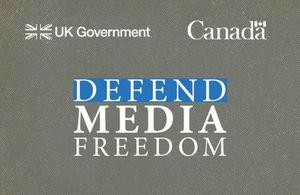The Global Conference for Media Freedom in 2019 will be the first of its kind. It will take place 10 to 11 July in London. The UK and Canadian governments are working together to defend media freedom and improve the safety of journalists who report across the world. Chrystia Freeland, Canadian Minister of Foreign Affairs, and Jeremy Hunt, the UK Foreign Secretary, will co-host the Global Conference for Media Freedom in London on 10 and 11 July 2019.
The Global Conference for Media Freedom is part of an international campaign to shine a global spotlight on media freedom and increase the cost to those that are attempting to restrict it. It will bring together global leaders and representatives from the media industry, journalists, civil society and academia and is supported by Luminate.
A free and independent media plays a vital role in protecting human rights and holding the powerful to account. Media freedom is the lifeblood of democracy and can be the foundation for economic prosperity and social development. It means that society can be free, fair and open. Journalistic scrutiny is an essential part of a vibrant and healthy democracy.
The world is becoming a more hostile place for journalists. Reporters Without Borders called 2018 the deadliest year on record for journalists. UNESCO confirms that at least 99 journalists were killed, a further 348 imprisoned and 60 held hostage. Freedom of expression is being stifled and barriers are preventing the functioning of an independent media. We must address this and the dangers it presents.
The Global Conference for Media Freedom will bring together government officials, multilateral agencies, civil society organisations, academics, editors, publishers, and journalists to debate the issue and take international action.
Facts and figures about media freedom
This information is sourced from organisations including the Committee to Protect Journalists, Freedom House, International Federation of Journalists, Reporters Without Borders and UNESCO:
2018 is the worst year on record for violence and abuse against journalists: more than half of the journalists were deliberately targeted and there has been a 15% increase in such killings since 2017. Source: Reporters Without Borders: 2018 round-up of deadly attacks and abuses against journalists
in 2018, at least 99 journalists were killed, a further 348 imprisoned and 60 held hostage. Sources: United Nations press release ‘Informing is not a crime’ UN chief calls for better protection of journalists press release and Reporters Without Borders: 2018 round-up
almost 1,000 journalists and media workers have been killed in the past decade. Source: Committee to Protect Journalists data on journalists killed, 1992 to 2019, with a confirmed motive
93% of those killed are local journalists and 7% are foreign correspondents. Source: UNESCO press release International Day to End Impunity for Crimes Against Journalists 2017
9 in 10 cases of killed journalists remain unresolved. Source: UNESCO International Day press release
only 13% of the world’s population enjoys a free press, and media independence and the autonomy of independent regulators has faced increased pressure. Source: Freedom of the Press 2017 press freedom’s dark horizon map
there has been an increase in incidents against journalists across all categories including murders, imprisonment, hostage-taking and enforced disappearances. Source: Reporters Without Borders 2018 round-up
journalists face dangers beyond warzones and extremism, including increasing intolerance to independent reporting, populism, rampant corruption, crime and the breakdown of law and order. Source: International Federation of Journalists press release 2018 reverses downward trend in killings of journalists and media staff with 94 victims of violence
impunity for crimes against journalists remains the norm, with justice in only 1 in 10 cases. Source: UNESCO International Day press release


